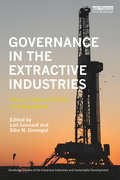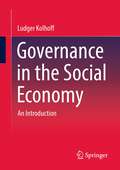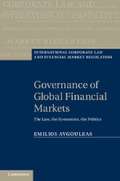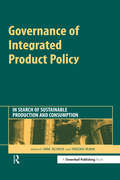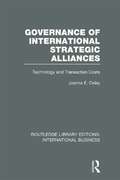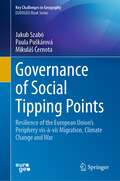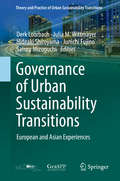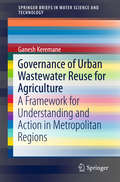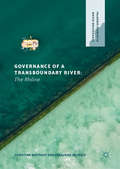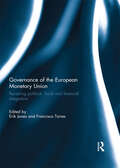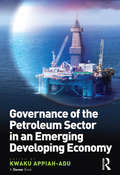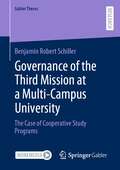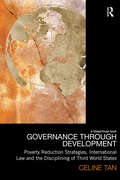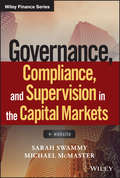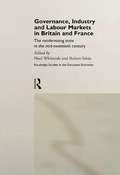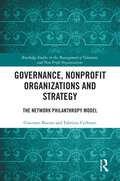- Table View
- List View
Governance in the Extractive Industries: Power, Cultural Politics and Regulation (Routledge Studies of the Extractive Industries and Sustainable Development)
by Lori Leonard Siba N. GrovoguiGreater understanding of the forms and consequences of investment and disinvestment in the extractive industries is required as a result of capitalist expansion, recent declines in global commodity prices, and claims that extractive sector projects, especially in the global south, are poverty reduction projects. This book explores emergent forms of governance in mining and extractive industry projects around the world. Chapters examine efforts to govern extractive activities across multiple political scales, through intermediaries, instruments, technologies, discourses, and infrastructures. The contributions analyse how multiple micro-processes of rule reverberate through societies to shape the material conditions of everyday life but also politics, social relations, and subjectivities in extractive economies. Detailed case studies are included from Africa (Chad, Nigeria, Rwanda, and São Tomé and Príncipe), Latin America (Bolivia, Ecuador, and Peru), and the UN Climate Conference.
Governance in the Social Economy: An Introduction
by Ludger KolhoffIn this textbook, governance aspects are presented and explained in a comprehensible way at different levels: After a look at the roots of the governance discussion in economics and political science, political and economic negotiation and problem-solving processes are discussed on the macro level "Orders of Governance" and institutional and normative framework conditions are considered; on the meso level "Cooperation", forms of steering and control as well as cooperation and coordination of social economy enterprises are dealt with; and on the micro level "Interactions", governance is dealt with from the perspective of the actors and their interactions.
Governance of Global Financial Markets
by Emilios AvgouleasThe recent financial crisis proved that pre-existing arrangements for the governance of global markets were flawed. With reform underway in the USA, the EU and elsewhere, Emilios Avgouleas explores some of the questions associated with building an effective governance system and analyses the evolution of existing structures. By critiquing the soft law structures dominating international financial regulation and examining the roles of financial innovation and the neo-liberal policies in the expansion of global financial markets, he offers a new epistemological reading of the causes of the global financial crisis. Requisite reforms leave serious gaps in cross-border supervision, in the resolution of global financial institutions and in the monitoring of risk originating in the shadow banking sector. To close these gaps and safeguard the stability of the international financial system, an evolutionary governance system is proposed that will also enhance the welfare role of global financial markets.
Governance of Integrated Product Policy: In Search of Sustainable Production and Consumption
by Dirk Scheer Frieder RubikEuropean policy patterns are in a state of transformation. New governance models are shifting power away from states and toward the involvement of all stakeholders and the idea of shared responsibility. It's a move from command and control to push and pull. What's in this new approach for the environment? This book provides a detailed analysis of the example of integrated product policy (IPP) which aims to improve the environmental performance of products and services through their life-cycle. All products cause environmental degradation in some way, whether from their manufacturing, use or disposal. The life-cycle of a product is often long and complicated. It covers all the areas from the extraction of natural resources, through their design, manufacture, assembly, marketing, distribution, sale and use to their eventual disposal as waste. At the same time it also involves many different actors such as designers, manufacturers, marketers, retailers and consumers. IPP attempts to systematically stimulate each phase of this complicated chain to improve its environmental performance. With the involvement of so many different products and actors there cannot be one simple policy measure for everything. Instead, IPP employs a whole variety of tools – both voluntary and mandatory – which are used to achieve identified objectives. These include economic instruments, the phase-out of dangerous materials, voluntary agreements, eco-labelling and product design guidelines. IPP is still in relative infancy and can be seen as an ongoing process hugely dependent on effective governance measures to ensure its continued success. This book presents a plethora of perspectives from policy-makers, researchers and consultancies, representatives from business, environmental and consumer associations on how to effectively conceptualise, institutionalise and implement IPP. The book is divided into four parts. First, the approach to the governance of IPP is examined in relation to other approaches to sustainable production and consumption. Second, the widely differing approaches to environmental product policy in practice at national, supranational and global level are analysed. Third, the book explores the challenge of designing a coherent policy mix to support the integration of sustainable consumption and production patterns by sector and theme. Finally, the book concentrates on the key issue of how to involve stakeholders in IPP in order to encourage continuous innovations for sustainability throughout the value chain. Governance of Integrated Product Policy aims to fill a clear gap in work to date on sustainable production and consumption by providing researchers and practitioners from politics, business and civil society new insights into modern environmental governance in practice.
Governance of International Strategic Alliances: Technology and Transaction Costs (Routledge Library Editions: International Business #Vol. 7.)
by Joanne OxleyInternational joint ventures and strategic alliances built on recent theoretical developments in Transaction Costs Economics (TCE) and the factors influencing the formation and governance of these alliances are examined in this analytical text. By bringing rigorous empirical analysis to an arena which has largely been pursued through speculative and theoretical approaches, this book will prove to be an insightful contribution to international business, strategy, and economics.
Governance of Social Tipping Points: Resilience of the European Union’s Periphery vis-à-vis Migration, Climate Change and War (Key Challenges in Geography)
by Jakub Szabó Paula Puškárová Mikuláš ČernotaThis monograph assesses the intersections between social tipping points (STP), a relatively understudied social-ecological concept, and various public policy concepts, such as governance, state capacity and resilience of the state and non-state actors, all within the context of the EU Eastern and Southern periphery. This unique approach is subsequently embodied in the newly created conceptual framework of how the STPs are governed and analyzed using three case studies. The goal is to examine how various state and non-state actors (transnational, private, and local) have managed to navigate the STPs triggered by migration, climate change, and geopolitics. The multi-level governance of STPs is studied within the context of the EU periphery, thus spatial and geographical determinants of the resilience are analyzed as well.
Governance of Urban Sustainability Transitions
by Derk Loorbach Julia M. Wittmayer Hideaki Shiroyama Junichi Fujino Satoru MizuguchiReading this book will lead to new insights compelling toan international audience into how cities address the sustainability challengesthey face. They do this by not repeating old patterns but by searching for newand innovative methods and instruments based on shared principles of atransitions approach. The book describes the quest of cities on two continentsto accelerate and stimulate such a transition to sustainability. The aim of thebook is twofold: to provide insights into how cities are addressing thischallenge conceptually and practically, and to learn from a comparison ofgovernance strategies in Europe and Asia. The book is informed by transitionthinking as it was developed in the last decade in Europe and as it isincreasingly being applied in Asia. The analytical framework is based onprinciples of transition management, which draws on insights from complexityscience, sociology, and governance theories. Only recently this approach hasbeen adapted to the urban context, and this book is an opportunity to share theseexperiences with a wider audience. For scholars this work offers a presentationof recent state-of-the-art theoretical developments in transition governanceapplied to the context of cities. For urban planners, professionals, andpractitioners it offers a framework for understanding ongoing developments aswell as methods and instruments for dealing with them. The content ispotentially appealing to post-graduate and graduate students of environmentalmanagement, policy studies, and urban studies programs.
Governance of Urban Wastewater Reuse for Agriculture
by Ganesh KeremaneThis book presents a conceptual and practical tool for those involved directly or indirectly in the planning and management of basic provision of water supply, wastewater and stormwater services in metropolitan regions by offering insights into governance paradigms and institutional arrangements for urban wastewater reuse in agriculture from Australia and India. Instead of focusing on the technical aspects of designing and building infrastructure, it provides a better understanding of the institutional and governance challenges of managing urban wastewater, particularly for reuse in agriculture. uot;; color:#18376A;mso-ansi-language:EN-US">As water supplies fall and water stress increases in many areas, the potential of wastewater as a resource is being widely recognized. Today, wastewater (re)use has become an attractive option for conserving and expanding available water supplies. While wastewater (re)use can have many applications, its use in agriculture is the most established, and the one with the longest tradition. Given the growing competition for freshwater from industry and cities, without doubt there is going to be a rapid increase in the global use of treated wastewater, making improved wastewater use in agriculture an emerging priority. Even though it is a vast resource if we reclaim it properly, often most wastewater is wasted. Therefore, in order to realize the full potential of this resource, decision support in policy design and implementation (Institutions and Governance) is key. Institutions and governance frameworks need to provide for the rights of access, rights of ownership, rights to manage source and treated water and the obligations of final use of recycling operations.
Governance of a Transboundary River: The Rhône (Palgrave Studies in Water Governance: Policy and Practice)
by Christian Bréthaut Géraldine PfliegerThis book examines the issues at stake in transboundary water governance, it spotlights the Rhône River, a biophysical entity of enormous historical, political and economic importance. The Rhône has long been viewed essentially as a tool for energy production, heavily canalized and exploited by a series of dams and nuclear power plants – with the result that those who live along this great river have simply turned away. Basing their work on a detailed analysis of the history and the current management of the Rhône, the authors explore the challenges linked with transboundary river basin governance including relevant international water law, appropriation of river and river resources by Nation States. Finally, they discuss a diverse range of institutional architectures and outlines several solutions that might cope with the growing complexity of transboundary management of a major river. The book will be of interest to scholars in fields such as environment studies, water policy and Natural Resource Management, it also has relevance to water managers and entrepreneurs concerned with staying abreast of developments in water policy and governance.
Governance of the Business Family
by John A. DavisExplains the purposes, processes, standards, plans, and agreements that together help to govern (or steer) a family that owns a family business.
Governance of the European Monetary Union: Recasting Political, Fiscal and Financial Integration (Journal of European Integration Special Issues)
by Erik Jones and Francisco TorresThe crisis in the euro area is a defining moment in the history of European integration. It has revealed major flaws in the architecture of the European Union; it has challenged European institutions to shape an appropriate response; and it has tested the patience of a European public that is eager to see their economic prospects improve again. This volume brings together some of the world’s top economists and policymakers to explain how this crisis came about and what is to be done. The policy agenda these chapters establish is going to be difficult to implement, not least because of popular misunderstanding and political opposition. This book argues, that it is essential that European policymakers push forward this agenda or they run the risk of seeing Europe’s economies fall back into crisis. This book was previously published as a special issue of the Journal of European Integration.
Governance of the Family Business
by John A. DavisReviews the ways to achieve governance of the family business. Points out the importance of plans (e.g., strategic plans), statements (e.g., mission statements), policies, rules, and agreements to the governance process. Discusses the roles of three structures in family business governance: the top management team, the family employee council, and the board of directors.
Governance of the Family Business Owners
by John A. DavisReviews the principal ways in which the owners of a family business achieve their governance objectives of a suitable identity and sensible direction and the discipline to achieve these. Covers the responsibilities and rights of owners, plus governance procedures, plans, policies, statements, rules, agreements, and structure.
Governance of the Global and Extra-Terrestrial Commons: What the Maritime Context Can Offer Outer Space
by Michael RoeThis book provides a unique analysis of the complex relationship between governance and the global commons. It has a specific reference to the dynamic and growing outer space economy and society, and how experience in the maritime sector (which exhibits many of the same issues and challenges as outer space) can be useful in suggesting moves forward in policy-making and design. This book fills a large gap in the literature of both governance and the development of outer space. Whilst the maritime sector has a long history of debate, albeit little in terms of governance and policy-making, outer space has much less and what there has been, commonly focused upon technical considerations. The importance of this book is that the failures of maritime governance need to be avoided in the outer space sector which exhibits many of the same issues particularly those related to the global commons. Innovative and exciting, this book will be of interest to academics studying corporate governance, business management, and space capitalism.
Governance of the IMF An Evaluation
by International Monetary FundA report from the International Monetary Fund.
Governance of the IMF Decision Making, Institutional Oversight, Transparency, and Accountability
by Leo Van HoutvenThe author-a top decision maker at the IMF for two decades-first focuses on the system of quotas and voting power in the IMF and concludes that it calls for reforms to enhance equity among the membership. He then examines decision making in the Executive Board, with an emphasis on consensus building in a cooperative institution, and the record of political oversight of the international monetary system through the Interim Committee and its successor, the International Monetary and Financial Committee. In that context, the author also comments on the impact on IMF decision making of the activities of groups of members, and of the differing interests of major shareholders. Thereafter, he recalls the distinctive features of the financial crises of the 1990s and examines their evolving implications for IMF governance. The essay concludes with an appraisal of IMF governance.
Governance of the Petroleum Sector in an Emerging Developing Economy
by Kwaku Appiah-AduOil exploration in the developing world has been and continues to be a high profile and high risk activity attracting media coverage and stimulating much debate. In Governance of the Petroleum Sector in an Emerging Developing Economy, Professor Kwaku Appiah-Adu has assembled an edited volume that provides insight into critical aspects of this highly sensitive activity. Professor Appiah-Adu’s starting point is Ghana, where he has been closely involved in national policy-making. The book makes comparisons between that African country and others as diverse as Trinidad and Tobago, and Norway. The contributors, global experts in their respective fields, explore five critical themes and propose strategies for progress in each. You will find an in-depth analysis relating to: turning oil and gas wealth into sustainable and equitable development; entrenching transparency and stakeholder engagement; effective management of the oil and gas sector; and safeguarding security and the environment. Finally, country specific models and lessons, particularly for Ghana and other African oil producing nations, are offered. This book serves as reference for business practitioners, policy makers, scholars, students and anyone interested in gaining insight into the oil and gas sector, particularly as it pertains to Ghana and other African petroleum producing nations, with lessons drawn from the global arena and international best practice.
Governance of the Third Mission at a Multi-Campus University: The Case of Cooperative Study Programs (Gabler Theses)
by Benjamin Robert SchillerThis book appeals to higher education scholars from various disciplines and practitioners looking for an overview and in-depth insight into cooperative study programs (CSPs). The CSPs combine elements of higher education with elements of professional work and illustrate how a teaching-related third mission achieves a socioeconomic contribution through its underlying stakeholder interactions. In Germany, CSPs are a growing phenomenon and, at the same time, a niche in higher education with approximately 100,000 students. Higher education scholars identified CSPs a challenge to higher education governance despite the simultaneous lack of empirical data. In this vein, this book pursues the question of how stakeholders influence the governance of the third mission in the case of CSPs. The study in this book refers to the “prime” example of CSPs at a German university of applied sciences—the Baden-Wuerttemberg Cooperative State University. The analysis revealed that four stakeholder groups are salient and influence the governance of the CSPs. These include professors, industry representatives, students, and representatives of government and higher education policy.
Governance through Development: Poverty Reduction Strategies, International Law and the Disciplining of Third World States (Law, Development and Globalization)
by Celine TanGovernance through Development locates the Poverty Reduction Strategy Paper (PRSP) framework within the broader context of international law and global governance, exploring its impact on third world state engagement with the global political economy and the international regulatory norms and institutions which support it. The PRSP framework has replaced the controversial structural adjustment programmes, as the primary mechanism through which official development financing is channelled to low-income developing countries. It has changed the regulatory landscape of international development financing, signalling a wider paradigmatic shift in the cartography of aid and, consequently, in the nature of north-south relations. Governance through Development documents and analyses this change within the legacy of postcolonial economic relations, revealing the wider legal, economic and geo-political significance of the PRSP framework. Celine Tan argues that the PRSP framework establishes a new regulatory regime that builds upon the disciplinary project of structural adjustment by embedding neoliberal economic conditionalities within a regime of domestic governance and public policy reform. The book will be of interest to scholars, researchers and students of law, political science and international relations, sociology and development studies.
Governance, Compliance and Supervision in the Capital Markets + Website (Wiley Finance)
by Sarah Swammy Michael McMasterThe definitive guide to capital markets regulatory compliance Governance, Compliance, and Supervision in the Capital Markets demystifies the regulatory environment, providing a practical, flexible roadmap for compliance. Banks and financial services firms are under heavy regulatory scrutiny, and must implement comprehensive controls to comply with new rules that are changing the way they conduct business. This book provides a way forward, with clear, actionable guidance that strengthens governance at all levels, and balances supervisory and compliance requirements with the need to do business. From regulatory schemes to individual roles and responsibilities, this invaluable guide details the most pressing issues in today's financial services organizations, and provides expert advice. The ancillary website provides additional tools and guidance, including checklists, required reading, and sample exercises that help strengthen understanding and ease real-world implementation. Providing both a broad overview of governance, compliance, and supervision, as well as detailed guidance on application, this book presents a solid framework for firms seeking a practical approach to meeting the new requirements. Understand the importance of governance and "Tone at the Top" Distinguish the roles of compliance and supervision within a financial services organization Delve into the regulatory scheme applicable to broker dealers, banks, and investment advisors Examine the risks and consequences of inadequate supervision at the organizational or individual level The capital markets regulatory environment is complex and ever-evolving, yet compliance is mandatory. A solid understanding of regulatory structure is critical, but must also be accompanied by a practical strategy for effective implementation. Governance, Compliance, and Supervision in the Capital Markets provides both, enabling today's banks and financial services firms to get back on track and get back to business.
Governance, Conflict, and Natural Resources in Africa: Understanding the Role of Foreign Investment Actors
by Hany Gamil BesadaA country's abundant natural resources may serve as a curse or a blessing, with the outcome often dependent on prevailing governance structures and experience managing these assets. Despite natural resource advantages, many African countries have failed to transform their enormous economic potential and wealth into tangible benefits such as sustainable socio-economic development, human security, or peace.Governance, Conflict, and Natural Resources in Africa reevaluates the role that foreign state-owned and private-sector actors play in resource-rich states – whether stable, post-conflict, or fragile – in sub-Saharan Africa. Through research and an analysis of in-depth interviews with local stakeholders in Ghana, Sierra Leone, and Ethiopia, Hany Besada explains how foreign state-owned and private-sector corporations have contributed to economic growth at both the national and local levels in different resource-rich countries. This book reveals the unique challenges and opportunities created by these investors, demonstrating that new policies in business practices and operations have the potential to generate sustainable development and positive economic transformation.Governance, Conflict, and Natural Resources in Africa puts forward a novel framework for understanding the role of private economic actors in extractive industries in Africa and sheds new light on foreign private-sector contributions to capacity building and economic development.
Governance, Corruption, and Economic Performance
by Sanjeev Gupta George T. AbedThis book brings together a range of research studies carried out by the IMF with the objective of promoting good governance in member countries in order to increase economic growth and reduce poverty. Topics discussed include: the causes and consequences of corruption; its impact on public finances and the provision of public services, tax revenues, income equality and poverty; and the issue of governance in transition economies.
Governance, Industry and Labour Markets in Britain and France: The Modernizing State (Routledge Studies in the European Economy)
by Robert Salais Noel WhitesideThis volume brings together well-known scholars from a wide range of disciplines to provide a superb analytical and historical overview of how state policy has affected established economic and labour market systems in France and Britain. The contributors to this book explore some crucial questions: * how 'dirigiste' was the French state in reality * why was state intervention more acceptable in France than in Britain * how do the differences in state intervention help to explain the respective economic performances of the two countries since the second world war? The book draws on hitherto unpublished primary research by scholars in economic and social history, industrial relations, economics, law, political science, sociology and social policy. As such, it is a timely and welcome intervention into debates concerning the politics of modern labour markets specifically and the role of the state in economic modernization more widely. It will have strong appeal to researchers and students in several discplines.
Governance, Management, and Accountability in Secondary Education in Sub-Saharan Africa
by World BankIncreasingly the role of management and governance is recognized as important for providing and delivering effective services at all levels of education. In view of the growing demand for more and better services at secondary education levels, these are crucial issues that must be addressed urgently. Sub-Saharan Africa's secondary education and training systems must become more efficient and more effective. The current (unit) costs of junior and senior secondary education in most African countries prevent massive expansion of post-primary education. This demands a holistic approach to governance and management issues. In parallel, there is a demand from civil society and governments for greater accountability. This study aims to present best practices and identify sustainable development plans for expansion and improved quality and efficiency in the delivery of secondary education in Sub-Saharan Africa through better governance, management, and accountability.
Governance, Nonprofit Organizations and Strategy: The Network Philanthropy Model (Routledge Studies in the Management of Voluntary and Non-Profit Organizations)
by Giacomo Boesso Fabrizio CerbioniGrant-making foundations play a crucial role in financing a wide range of philanthropic projects that contribute to the social and economic development of targeted communities. In fulfilling this essential function, the trustees who serve on each foundation's board of directors must ensure not only the economic and financial stability of their organization but also a balance with the expectations of the diverse social actors operating in the community, including associations, cooperatives, and operational foundations. This book identifies the features of the planning, programming, and controlling model of foundations that better facilitate a positive mediation between a strategic approach and civic dimensions. It offers insights and practical recommendations for designing governance and control mechanisms that promote transparency, accountability, and a network approach in the grant-making process and underscores the significance of a suitable governance framework in fostering trust and mutual understanding between foundations and their stakeholders. The guidance provided in this volume is based on rigorous research and real-world experiences, making it relevant and applicable to scholars and practitioners in the field. It serves as a valuable resource for those seeking to enhance the governance mechanisms within nonprofit organizations to maximize the impact of their philanthropic initiatives.
